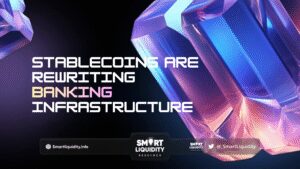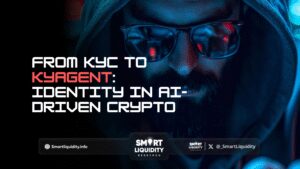What Are Decentralized Exchanges & How Do DEXs Work?


DEXs are peer-to-peer marketplaces for exchanging cryptocurrencies directly without needing a middleman. Instead, smart contracts, which are computer-programmed agreements carry out their terms automatically, facilitating such trades.
What Is Decentralized Exchange?
Centralized platforms are run by an entity, typically a financial institution that provides related services for profit. Due to their position as regulated institutions that custodial customers’ assets and provide simple interfaces for newbies, centralized platforms account for the most significant portion of trade activity in the crypto market. Assets deposited in certain centralized exchanges are even covered by insurance.
A centralized exchange offers services similar to the ones offered by a financial institution. To facilitate the transfer of funds, the bank provides monitoring services and security that which private citizens cannot. While users of decentralized exchanges can conduct transactions without ever having to remove their wallets from their pockets. If a trader misplaces their secret keys or transfers money to the wrong addresses, they are held accountable for losing those funds.
Users can freely trade IOU tokens supported by their deposits or assets through decentralized platform portals. Any blockchain-based token representing an IOU has almost the same worth as a vital asset. Top blockchains that allow smart contracts have now become the foundation for popular decentralized exchanges. They are known as layer-one protocols, meaning they are built on top of the blockchain—the Ethereum blockchain powers most of the market’s favorite DEXs.
DEXs were developed to eliminate the need for a central authority to monitor and approve trades made on the platform. Instead, P2P trading of cryptos is made possible via decentralized exchanges. To buy or sell cryptocurrency through a peer-to-peer marketplace. It means that the user never gives over ownership of their private keys to the wallet, as non-custodial services do not store user funds.
To access one’s digital currency, users must have a private key, a form of sophisticated encryption. After successfully authenticating into the DEX with a user’s private key, the user will have instantaneous access to their cryptocurrency holdings. They would not need to give personal details like names and locations, which is terrific for folks who respect their privacy.
How Do DEXs Work?
DEXs, in contrast to centralized platforms like Coinbase, do not facilitate the trading of fiat currency for cryptocurrencies. Instead, they only deal in trading cryptocurrency tokens among themselves. Centralized exchanges (CEXs) allow you to trade various cryptocurrencies against one another or fiat currency.
You can also typically make more complicated maneuvers, including margin trading. Like stock exchanges like Nasdaq, cryptocurrency exchanges utilize an “order book” to set the price of a cryptocurrency depending on the quantity of buy and sell orders at any one time.
Decentralized exchanges are a series of smart contracts. They employ “liquidity pools” where investors lock assets in return for interest-like returns to expedite trades and set the prices of different cryptocurrencies against each other using algorithms.
A DEX’s transactions are settled on the blockchain instead of the centralized exchange’s database.
DEXs are frequently constructed on open-source code so that anyone interested may see precisely how they work. It also means that other projects can fork Uniswap’s code to compete with it; for example, Sushiswap and Pancakeswap both include the word “swap” in their names because they forked Uniswap’s technology.
🔸Automated market makers
A system of AMMs built on smart contracts was developed to address the liquidity issue. These marketplaces owe gratitude to Vitalik Buterin, co-creator of Ethereum, who wrote a paper about decentralized exchanges that details how to use smart contracts and tokens to conduct financial transactions on the network.
Such AMMs use blockchain-based services, often called blockchain oracles, to ascertain the worth of traded assets by aggregating data from numerous exchanges and several other platforms. Smart contracts on these decentralized applications use a pre-funded pool of assets called liquidity pools rather than a traditional matching market to settle trades between buyers and sellers.
🔸Order book DEXs
Every open purchase and sell order for any given asset pair is kept in order books. A trader’s willingness to buy any asset at a specific price that is stipulated by a buy order. In contrast, a trader’s willingness to trade a digital asset at a particular cost is characterized by a sell order.
For order-book DEXs, users’ funds are kept in their wallets while the order information is stored on-chain. However, while a transaction’s profit potential is increased by using loaned funds to expand the scope of the position, the risk of closure is also increased because loans must be repaid despite any outcome of the trade.
What Is The Best Decentralized Exchange?
OKX is one of the most significant worldwide crypto exchanges, having over 20 million users worldwide. More than 350 cryptocurrency tokens are available for trading on OKX’s controlled exchange, and the exchange cost is only 0.10%.
In addition to traditional centralized trading, OKX facilitates P2P transactions between users for the most liquid coins. OKX’s decentralized exchange allows users to set their pricing and accept payments through more than 900 different methods. As a result, accessing funds in whichever currency a vendor chooses is a breeze.
Not only is trading on OKX’s P2P exchange free of charge, but it’s also free of any restrictions on who can participate. A trader only has to pay if they wish to post an ad for a deal to help fellow traders find what they’re selling or buying on the DEX.
OKX makes it easy to place a decentralized order. To make a trade on OKX, you must pick a coin, enter the amount you want to purchase or sell, and select a payment method. OKX’s decentralized exchange also makes it simple to track traders, which is helpful if a buyer or seller wants to keep tabs on those who frequently use the same payment methods they do.
Conclusion
More applications could be developed in the future because these platforms are based on smart contracts that can run autonomously. Flash loans, obtained and reimbursed in a single transaction, demonstrate how advancements in the decentralized financial industry make new types of financial products and services available.




